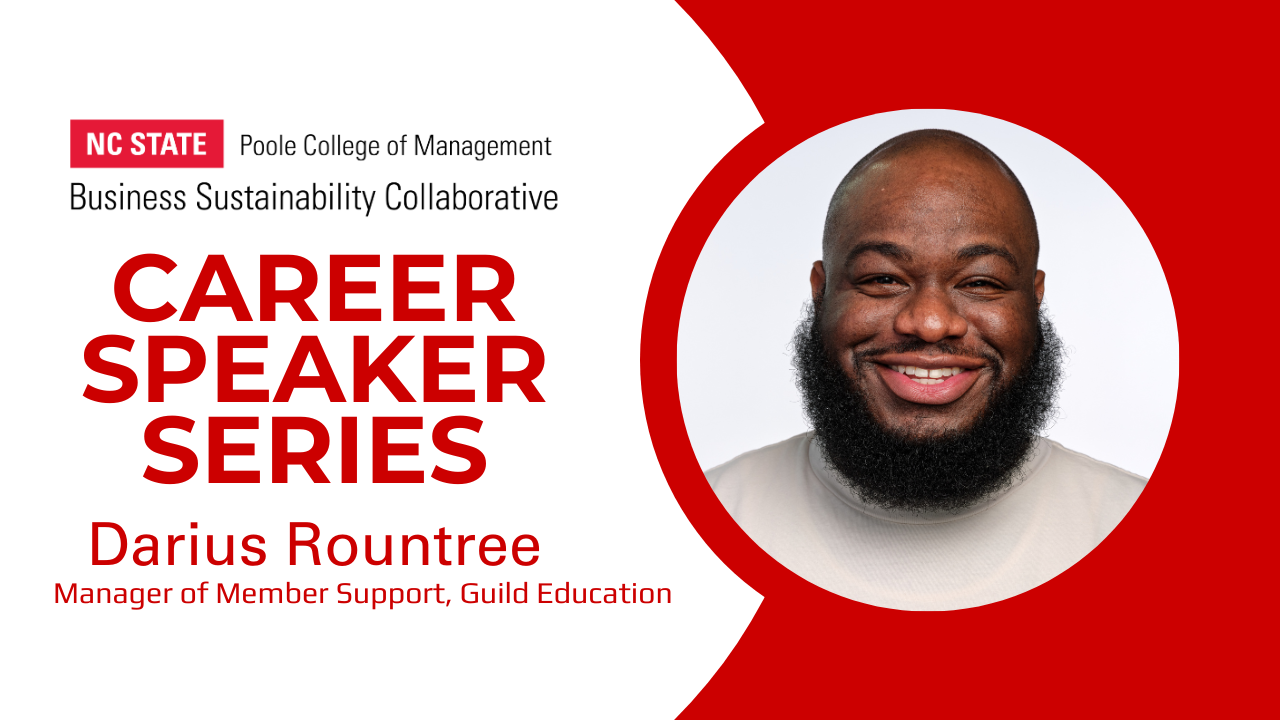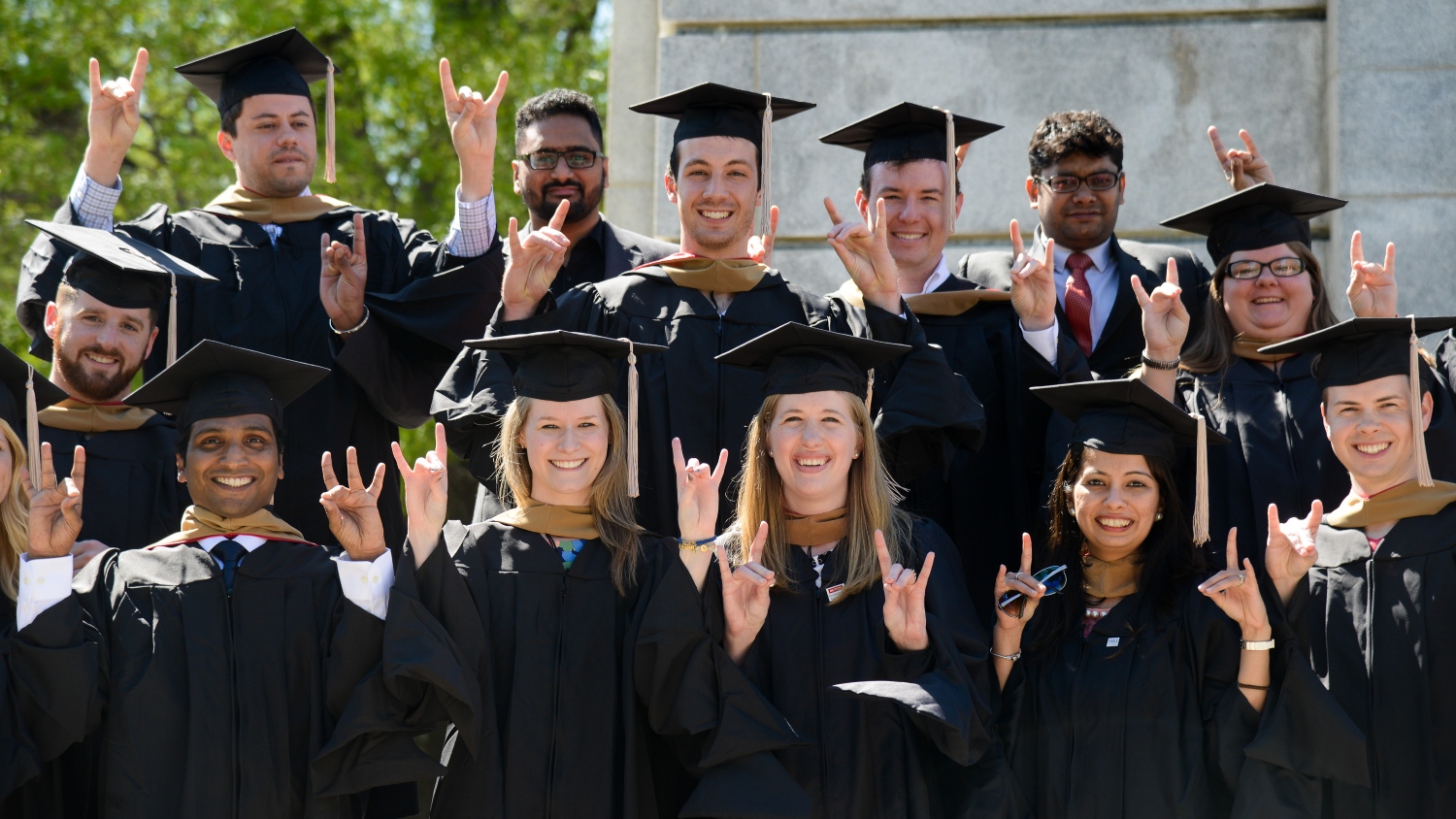Jenkins MBA Residency #2: A Deep Dive into Key Management Topics
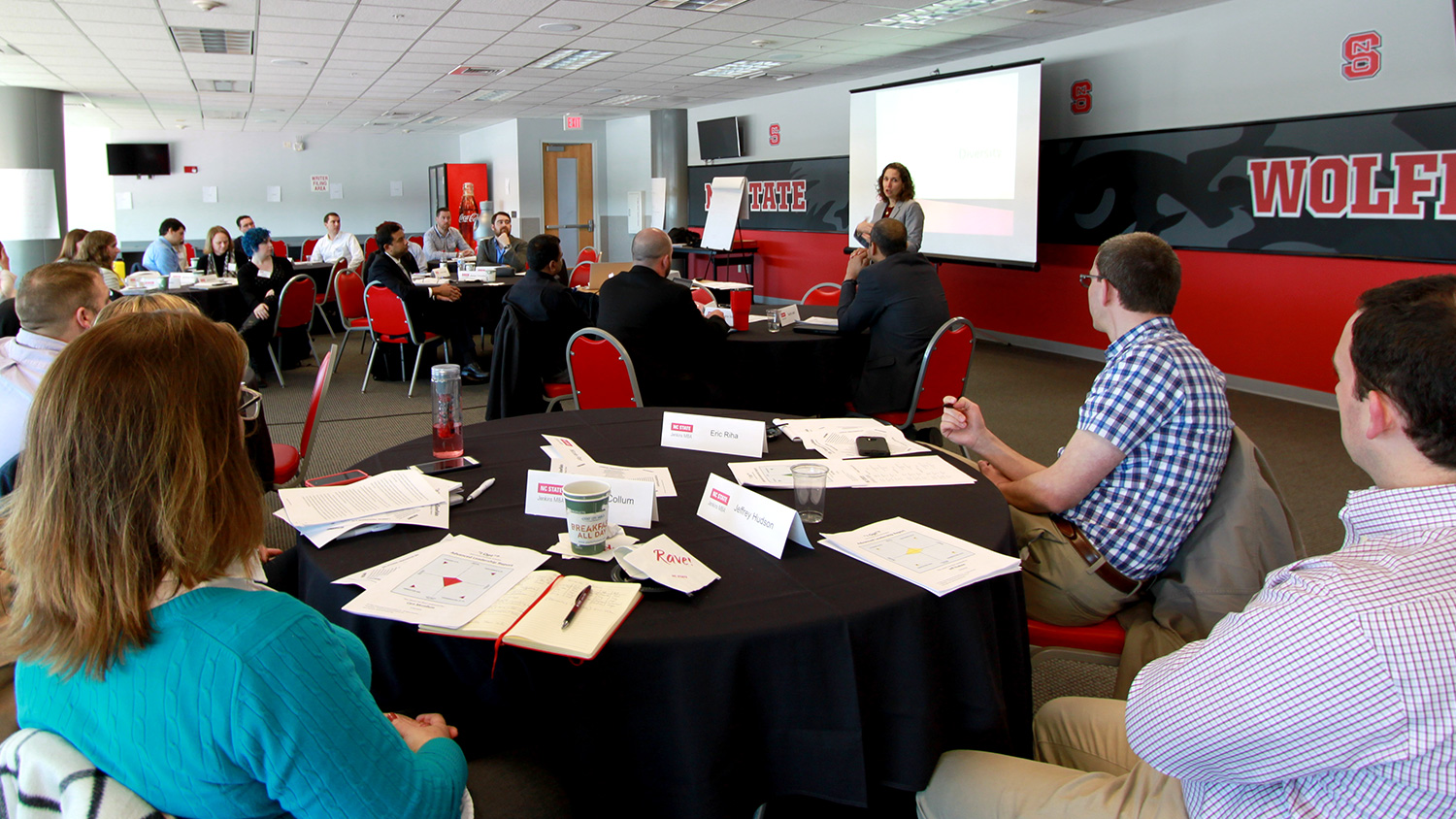
While NC State University was on spring break earlier this year, about 90 students in the NC State Jenkins MBA professional and online programs were taking a deep dive into three key management topics – managing people, empowerment and relationship building, and global leadership and leading teams.
In addition to gaining new understanding, the experience also provided opportunities for the students to meet and talk with their virtual classmates, to find common interests and exchange ideas. At one table over lunch, for example, two students discovered they had a common interest in auto racing, and two others were licensed airplane pilots.
Why a Residency?
“Two years ago, we decided to change how we teach our MBA students about leadership,” said Bradley Kirkman, General (Ret.) H. Hugh Shelton Distinguished Professor and one of the instructors in what is now the Jenkins MBA program’s Residency #2. This experience is for students in the second year of the NC State Jenkins MBA program. The first residency is completed in the first year.
The 2018 Residency #2 was held at NC State’s Carter Finley Stadium March 8 through March 10, with sessions taught by Poole College leaders in their fields, and coordinated by Dr. Leigh Shamblin, professor of practice. All are on the faculty of the college’s Department of Management, Innovation and Entrepreneurship.
While the students did take a little time to pose for a photo on the Wolfpack’s 40 yard line, their days were filled with faculty presentations, exercises and discussions that let them unpack and apply what they were learning to experiences in their current roles and to prepare them for future roles. And yes, they also had written assignments for each session, to turn in later.
Divided into three cohorts, the students focused one full day on each of the topics, presented in the interactive format used by NC State Executive Education, LLC. Following are summaries from the three sessions.
Managing People
Presenter | Beth Ritter, associate professor of practice, human resources
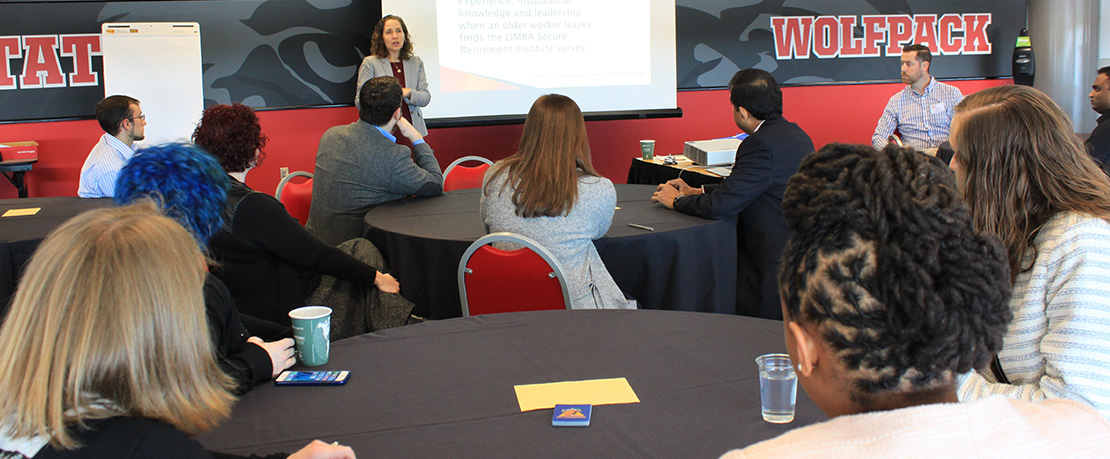
The Managing People section of Residency #2 covers topics from an individual, team and organizational perspective. “Human beings are information processors,” Ritter said when starting an individual awareness segment in her session.
And people managers have a lot to consider, including:
- Digital transformation, including changes in technology that already enables a global, mobile workforce;
- Attracting a diverse workforce;
- Anticipating changing rules, procedures and authority;
- Creating environments where employees want to work versus need to work;
- Retaining institutional knowledge as workers retire, and
- The impact of robotics on personnel needs.
They also must also anticipate the implications of these changes on the culture, engagement and productivity of their organizations, Ritter said.
Personal Strategic Style
With so much information to process, individuals need to understand their own strategic information processing style and that of their team members to be the most effective.
Ritter introduced the students to the I-OPT ™ assessment tool by Professional Communications, Inc. It measures the amount and kind of information a person considers before responding to new ideas, issues, goals or processes, thus enabling them to better understand their own strategic style based on where they were in relation to four dimensions provided by the tool: Relational Innovator, Hypothetical Analyzer, Logical Processor and Reactive Stimulator.
Ritter and the students also discussed the concept of the individual’s personal fit – to the job and to the organization. “Research suggests that individuals and organizations are most effective when their values, needs and interests are aligned,” she said.
Empowerment and Relationship Building
Presenter | Professor Roger Mayer
In a multi-stage exercise, Mayer enabled students to draw connections between relationship-building and empowerment, and how those connections impact decision making at the individual and group level. Done effectively, individuals and teams are enabled to get the job done because they are empowered to ask for the help or resources needed, he said.
“A big piece of what you do when you empower is to take people from dependency to independence,” Mayer said. “That’s what you want your employees to do; it makes them – and you – more successful,” he said. Positive feedback is also important, as it “reinforces confidence in the individual, the feeling that ‘I can do the next step,’” he said.
In the past, Mayer said, “we talked about needs, and one of the needs was power, to feel in control.” Now, empowerment gives you the power to get there, but that requires letting go of some control. He encouraged the students to consider, “Am I willing to cede power? This empowers me more because then I can focus on what I need to do.” It also requires allowing the other individual to find his or her own way of doing the task and, sometimes, to make mistakes.
But the supervisor (or team leader) also needs to keep open channels of communications, so that the other is willing ask for help when needed. “Think about a new employee,” Mayer said. “If you ask, ‘What do you need to do your job?’ but the employee says nothing, then that failure is yours.”
Global Leadership/Leading Teams
Presenter | Professor Bradley Kirkman
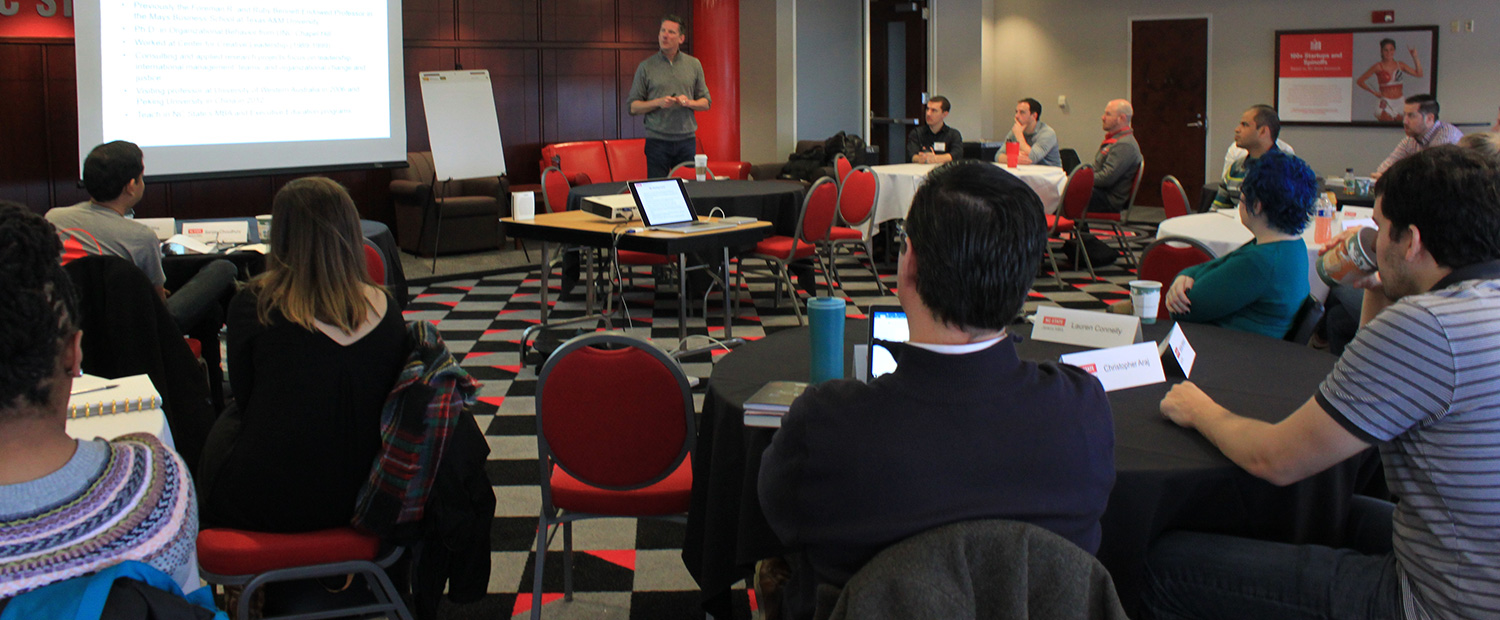
Kirkman began his team leadership session by asking the students: “What makes a successful global leader?”
Following the array of student responses, he added one more – “a healthy dose of CQ” – that is, cultural intelligence, “a person’s capability to adapt effectively to a new cultural context, to have empathy, to refuse to let mistakes frustrate, to adapt to local customs,” he said.
The value of CQ
“A person with high cultural intelligence teases out of a person’s or a group’s behavior those features that would be true of all people and all groups, those peculiar to the particular person or group, and those that are neither universal nor idiosyncratic,” Kirkman said.
“Some of us are born with a fair amount of it (CQ), and a lot of us can develop it over time,” he said.
Kirkman provided an overview of the six-step methodology that Christopher Earley, at the University of Technology in Sydney, Australia, developed to help individuals boost their CQ and strengthen their global teams.
“The first step is to examine your personal CQ strengths and identify your developmental needs, then find training opportunities that focus on those needs,” Kirkman said. The final step, one that he added, is: “Learn to laugh at yourself.”
The full process is described in the book, “3D Team Leadership, A New Approach for Complex Teams,” that Kirkman co-authored with T. Brad Harris, an assistant professor of management, innovation and leadership at the TCU Neeley School of Business.
CQ = Competitive Advantage
Why is understanding cultural differences important? A key reason: the success of international assignments offers a competitive advantage in today’s fast-changing global economy, Kirkman said.
That said, complexity in today’s work teams goes beyond global culture. It includes balancing the number and diversity of teams one person is called to serve on within an organization and the diversity of roles within those teams.
To be effective in this kind of environment requires focus, “knowing where to devote your time and attention at any given point to maximize your and your teams’ effectiveness. It’s about working smarter, not necessarily harder,” he said.
That includes understanding the functionality of the individual team and whether that involves one-on-one interactions, working with teams as a whole or as groups.
“Teams may morph into groups and back again,” Kirkman said. “You need to know where you are at any given time, and recognize that you may need to change your approach throughout.”
Global leaders are both born and made, Kirkman said. Overcoming individual shortcomings requires “being honest … and finding others who have what you don’t have, so you can balance your team and compensate for your developmental needs.”
Peeling Back the Onion
It also requires acknowledging the various forces that shape culture, including religion, government, economics, the media, geography. He offered two metaphors to help individuals understand the importance of developing CQ.
- The Onion Metaphor: You don’t understand (what it contains) unless you peel back the layers
- The Iceberg Metaphor: The most interesting part is below the surface.
- Categories:

